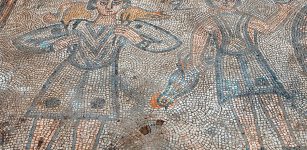Jeanne de Clisson ‘Lioness Of Bretagne’: Her Black Painted Ships With Red Sails Terrorized English Channel
A. Sutherland - AncientPages.com - Among many brave and rebellious women of old times that conquered the world was also Jeanne de Clisson (1300-1359). She took revenge for the death of her husband.
Known as the 'Lioness of Bretagne,' she became a famous pirate that stalked the English Channel and ravaged the French coastline.
 Jeanne de Belleville, aka Jeanne de Clisson. source
Jeanne de Belleville, aka Jeanne de Clisson. source
According to legend, Jeanne de Clisson's black-painted ships with red sails sowed terror in the region for thirteen years.
However, it wasn't without reason.
Jeanne de Clisson was born Jeanne de Belleville in Belleville-sur-Vie, a castle and fortress on the western coast of France.
She was a good mother and a happy wife to Breton nobleman Olivier de Clisson. Jeanne was a good and loyal French noblewoman for most of her life.
Jeanne's Husband Must Go To War
In April 1341, the War of Succession of Brittany broke out, and France went to war with England. The Breton War of Succession (1341–65) was an essential historical episode of the Hundred Years War (1337–1453, the conflict between England and France).
When Jean III, duke of Brittany, dies without leaving an heir, his duchy is disputed by two sides. On one side, by his niece, Jeanne de Penthievre, the wife of Charles de Blois, and on the other, by Jean de Montfort, Thus the duchy of Brittany becomes an issue even beyond its borders.
As a result, King Philip VI of France defends the party of his nephew Charles de Blois; several Bretons gather under the banner of Montfort (the half-brother of the deceased duke.) Jeanne's husband, Olivier, chose to back his friend, Charles de Blois, in his claim to the duchy.
Clisson Castle at night. Image credit: Brice44 - CC BY-SA 3.0
In 1342, as one of the military commanders defending the city Vannes in northwestern France, Olivier de Clisson was taken prisoner, but he was soon released in a prisoner exchange.
Jeanne's Husband Was Not Trusted
Strangely, Charles de Blois became convinced that Olivier should not be trusted anymore. According to him, his friend was a traitor and had already defected to the English side. King Philip VI also believed Olivier was working for the English. On 19 January 1343, Olivier and fifteen other Breton lords were invited to a tournament on French soil.
He was suspected of not having defended the city to his fullest and accused of treason. He was arrested, taken to Paris, and tried.
On 2 August 1343, he was beheaded. His execution shocked Jeanne, his wife, and the whole nation.
Enraged, Jeanne Took To The Sea And Became A Cruel Pirate
After the death of her husband, Jeanne de Clisson made an important decision in her life as a widow and mother. She wanted to avenge her husband, who she believed was cunningly captured and executed at the court of the French king.
She did not intend to sink into mourning but gathered a small group and launched terrible attacks on French garrisons. When she could no longer stay on the continent, she moved to England and became a pirate.
 Execution of Olivier IV de Clisson. Painting is attributed to Loyset Liédet, Flemish illuminator (v.1420-v.1483) in the "Chronicles of Lord Jehan Froissart. Image credit: Liédet, Loyset - Public Domain
Execution of Olivier IV de Clisson. Painting is attributed to Loyset Liédet, Flemish illuminator (v.1420-v.1483) in the "Chronicles of Lord Jehan Froissart. Image credit: Liédet, Loyset - Public Domain
She sold the family property, sold her belongings, and decided to fight the French country not on the land but from the sea. She attacked from the fog without warning; she always left one survivor to spread the word of her doings. King Philip VI was furious and wanted to capture Jeanne. His soldiers hunted her, raiding her ship and killing her crew. On one occasion, she barely escaped with her children.
After this incident that could end tragically, Jeanne began rowing toward England. It took five days and nights, during which one of her sons died. Finally, she was rescued and arrived at Morlaix of Brittany in northwestern France.
Now she was ready to continue her revenge using the Black Fleet. With the English king's help and Breton's support, Jeanne prepared three black-painted warships with red sails. According to legend, her ships successfully sowed terror among French boats in the English Channel for thirteen years.
Her pirates burned cities, massacring French noblemen; her pirate crew attacked French ships during the Breton succession war from 1343 to 1356. She always left one (or three, in another version) sailors alive on the boats she attacked to ensure the French king was told she was in charge. It is possible, but not confirmed that she had concluded an alliance with England.
When King Philip VI died in 1350, the 'Lioness of Brittany' remained faithful to the Montfort House, supported by the English.
She finally abandoned piracy in 1356 and married Sir Walter Bentley, one of the faithful lieutenants of King Edward III, with whom she spent peaceful days in the coastal town of Hennebont. She died around 1359.
Written by – A. Sutherland - AncientPages.com Senior Staff Writer
Updated on September 27, 2022
Copyright © AncientPages.com All rights reserved. This material may not be published, broadcast, rewritten or redistributed in whole or part without the express written permission of AncientPages.com
Expand for referencesReferences:
Wagner J. A. Encyclopedia of the Hundred Years War
Duncombe, L. Sook. Pirate Women
Charles River Editors. History’s Famous Women Pirates
More From Ancient Pages
-
 Mosaics Discovered In 1,600-Year-Old Church In Mardin Province,Turkey
Archaeology | Sep 22, 2020
Mosaics Discovered In 1,600-Year-Old Church In Mardin Province,Turkey
Archaeology | Sep 22, 2020 -
 Cremation In The Near East Dates Back To 7,000 B.C.
Archaeology | Aug 13, 2020
Cremation In The Near East Dates Back To 7,000 B.C.
Archaeology | Aug 13, 2020 -
 On This Day In History: Charter Of The Forest Was First Issued On London – On Nov 6, 1217
Featured Stories | Nov 6, 2016
On This Day In History: Charter Of The Forest Was First Issued On London – On Nov 6, 1217
Featured Stories | Nov 6, 2016 -
 New Fossil Ape Challenges The Story Of Human Evolution
Evolution | Aug 24, 2023
New Fossil Ape Challenges The Story Of Human Evolution
Evolution | Aug 24, 2023 -
 What Was Lex Salica?
Ancient History Facts | Dec 13, 2017
What Was Lex Salica?
Ancient History Facts | Dec 13, 2017 -
 Tomb Of A 1,000-Year-Old Sican Surgeon Wearing A Golden Mask Discovered In Peru
Archaeology | Mar 30, 2022
Tomb Of A 1,000-Year-Old Sican Surgeon Wearing A Golden Mask Discovered In Peru
Archaeology | Mar 30, 2022 -
 The Caesar Cipher: Ancient And Simple Yet Effective Cipher Used By Julius Caesar
Ancient History Facts | May 30, 2018
The Caesar Cipher: Ancient And Simple Yet Effective Cipher Used By Julius Caesar
Ancient History Facts | May 30, 2018 -
 Secrets Of Ninja Swords – Favorite Weapon Of The Shinobi
Featured Stories | Aug 13, 2018
Secrets Of Ninja Swords – Favorite Weapon Of The Shinobi
Featured Stories | Aug 13, 2018 -
 When Did Humans Start Using Roads And What Civilization Built The First Paved Roads?
Archaeology | Oct 26, 2022
When Did Humans Start Using Roads And What Civilization Built The First Paved Roads?
Archaeology | Oct 26, 2022 -
 Ancient Atlantean Sculpture Discovered At The Mayan Chichen Itza Archaeological Site
Archaeology | Aug 29, 2023
Ancient Atlantean Sculpture Discovered At The Mayan Chichen Itza Archaeological Site
Archaeology | Aug 29, 2023 -
 Chinampas: Artificial Islands Created By The Aztecs To Improve Agriculture
Ancient History Facts | May 17, 2016
Chinampas: Artificial Islands Created By The Aztecs To Improve Agriculture
Ancient History Facts | May 17, 2016 -
 Highly Sophisticated Underground City Of Derinkuyu – Who Were The Master Builders?
Featured Stories | Jul 22, 2014
Highly Sophisticated Underground City Of Derinkuyu – Who Were The Master Builders?
Featured Stories | Jul 22, 2014 -
 Evidence Americas’ Oldest Mine In Wyoming Was Used By Paleoindians 13,000 Years Ago Has Been Found!
Archaeology | May 19, 2022
Evidence Americas’ Oldest Mine In Wyoming Was Used By Paleoindians 13,000 Years Ago Has Been Found!
Archaeology | May 19, 2022 -
 Burial Chambers In The Pyramids Of Tombos Change Our Understanding Of Ancient Egyptian Civilization
Archaeology | Mar 25, 2025
Burial Chambers In The Pyramids Of Tombos Change Our Understanding Of Ancient Egyptian Civilization
Archaeology | Mar 25, 2025 -
 Aristotle’s Influence On Education Of Alexander The Great – Historical Encounter Of Two Famous Men
Featured Stories | Dec 24, 2018
Aristotle’s Influence On Education Of Alexander The Great – Historical Encounter Of Two Famous Men
Featured Stories | Dec 24, 2018 -
 World’s oldest bible -The Codex Sinaiticus – to be displayed at the British Museum
News | Sep 1, 2015
World’s oldest bible -The Codex Sinaiticus – to be displayed at the British Museum
News | Sep 1, 2015 -
 Scientists Investigate – Did The Human Brain Shrink 3,000 Years Ago?
Human Beginnings | Aug 6, 2022
Scientists Investigate – Did The Human Brain Shrink 3,000 Years Ago?
Human Beginnings | Aug 6, 2022 -
 ‘Reforms of Shang Yang’ – Location Of Ancient Yueyang – Confirmed
Archaeology | Jan 25, 2016
‘Reforms of Shang Yang’ – Location Of Ancient Yueyang – Confirmed
Archaeology | Jan 25, 2016 -
 The Birdman Of Siberia: Sensational Finds In The Heart Of Russia Puzzle Scientists
Archaeology | May 31, 2019
The Birdman Of Siberia: Sensational Finds In The Heart Of Russia Puzzle Scientists
Archaeology | May 31, 2019 -
 Ancient Greeks Reached Iceland Before The Vikings – New Theory Suggests
Featured Stories | Dec 10, 2022
Ancient Greeks Reached Iceland Before The Vikings – New Theory Suggests
Featured Stories | Dec 10, 2022

